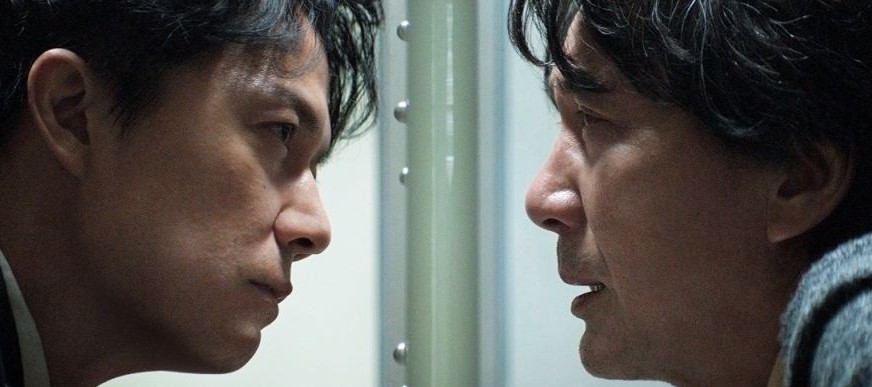Sleepy or slick?
When a lawyer is asked to help find a way of preventing a murderer from getting the death penalty, a back and forth ensues to find the real reasoning behind the crime.
You may not have heard of director Hirokazu Koreeda if you’re not a Japanese film aficionado (and I’m certainly not), and you also probably aren’t aware that lead lawyer Shigemori is played by J-pop heartthrob Masaharu Fukuyama. Neither of these things matters much, except to say that this is their second film together, having previously worked on Like Father, Like Son back in 2013.
On the surface, this film is meant to be a taut courtroom thriller, but the best moments are spent out in the field, as Shigemori and his two colleagues try to figure out what the real motive was for the seemingly affable Misumi – played by Kōji Yakusho (who might be more recognisable to western audiences) – to murder his boss.
We see snowy Hokkaido, and early on there is a teasing cityscape shot to make you think you’ll see more of the locations. Halfway through, however, when it becomes apparent that Misumi isn’t being wholly honest with his defense team, the film becomes bogged down in melodramatic interrogation.
Fukuyama and Yakusho play off each other well, but stuck in a tiny grey room and separated by a glass screen, they seem to argue in an infinite loop. As time goes on, you want to scream for Shigemori to just bloody well ask him why he did it and stop wasting time.
‘You want to scream for Shigemori to just bloody well ask him why he did it’
A small caveat should be added here, in that I saw this after having had a couple of drinks, which could have something to do with the fact that both myself and my viewing companion found ourselves nodding off (you can read more about that trip here). The way this film is shot is very static – again, the early tracking shot on the taxi is misleading – and there is a gratingly slow, almost imperceptible pan to every take. This makes for an infuriating watch, likely to put you out cold than on the edge of your seat.
If you’re going to shoot statically, the story needs to move more and the editing needs to be slicker and the acting more fiery. Granted, there is a scene towards the end where Shigemori and Misumi’s faces overlap in the reflection of the glass, slowly pulling apart as realisation hits, but you have a long slog ahead of you to reach that point.
What is interesting about the film is the subtle nods towards Japanese life; particularly the men, who seem to work, sleep and eat at their office. They neglect family and we’re never shown many social interactions, which is suggestive of how harsh working in Japan is thought to be – this is a cultural aspect which might be more stark to audiences outside of Japan.
Notable also, is the commentary on the Japanese justice system, where the film seems to suggest that judges and lawyers collude on cases to keep the system moving, rather than taking the necessary time defendants deserve. Other things the film skirts over are: the moral dilemma faced as defense lawyers and the symbolism of the crucifix – but perhaps these were lost on me via the cultural divide.
A slow, slightly frustrating courtroom, family drama, you at least are given some form of closure by the end of the film, but it could be so much shorter and so much slicker. The oddly staged moments of melodrama – a hand left out after a handshake is long over, for example – also do nothing to endear you to this film.
It might have been a better idea to drastically reduce scenes with Misumi, flipping between his confused testimony, and have more of the legwork, piecing together the real story and putting the audience in charge of the investigation. Alas, we’re not looking at a noir, private investigator piece here, so don’t go in without your coffee.
